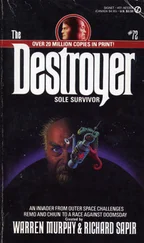‘What’s your name?’ a man asked.
‘Joe Carpenter.’
‘Who’re you waiting for?’
‘I don’t know her name.’
‘What do you call her?’
‘Demi.’
‘Walk a block and a half south. Turn right at the corner and keep going until you come to a bookstore. It’s still open. Go in, find the biography section.’
The caller hung up.
After all, there wasn’t going to be a pleasant get-acquainted chat over coffee.
According to the business hours posted on the glass door, the bookstore closed on Sundays at six o’clock. It was a quarter past six. Through the big display windows, Joe saw that the fluorescent panels toward the front of the store were dark; only a few at the back were lighted, but when he tried the door, it was unlocked.
Inside, a single clerk waited at the cashiers’ counter. He was black, in his late thirties, as small and wiry as a jockey, with a moustache and goatee. Behind the thick lenses of his horn-rimmed glasses, his eyes were as large as those of a persistent interrogator in a dream of inquisition.
‘Biographies?’ Joe asked.
Coming out from behind the counter, the clerk pointed to the right rear corner of the store, where light glowed beyond ranks of shadowed shelves.
As he headed deeper into the maze of books, Joe heard the front door being locked behind him.
In the biography aisle, another black man was waiting. He was a huge slab of ebony — and appeared capable of being an irresistible force or an immovable object, whichever was required. His face was as placid as that of Buddha, but his eyes were like Kansas windows with views of tornadoes.
He said, ‘Assume the position.’
At once Joe knew he was dealing with a cop or former cop.
Obediently, he faced a wall of books, spread his legs wide, leaned forward with both hands against the shelves, and stared at the spines of the volumes in front of him. One in particular caught his attention: a massive biography of Henry James, the writer.
Henry James.
For some reason even that name seemed significant. Everything seemed significant, but nothing was. Least of all, the name of a long-dead writer.
The cop frisked him quickly and professionally, searching for a weapon or a transmitter. When he found neither, he said, ‘Show me some ID.’
Joe turned away from the shelves and fished his driver’s license from his wallet.
The cop compared the photo on the license with Joe’s face, read his vital statistics and compared them to the reality, then returned the card. ‘See the cashier.’
‘What?’
‘The guy when you came in.’
The wiry man with the goatee was waiting by the front door. He unlocked it as Joe approached. ‘You still have the phone?’
Joe offered it to him.
‘No, hold on to it,’ the cashier said. ‘There’s a black Mustang parked at the curb. Drive it down to Wilshire and turn west. You’ll be contacted.’
As the cashier opened the door and held it, Joe stared at the car and said, ‘Whose is it?’
From behind the bottle-thick lenses, the magnified eyes studied him as though he were a bacterium at the lower end of a microscope. ‘What’s it matter whose?’
‘Doesn’t, I guess.’
Joe went outside and got into the Mustang. The keys were in the ignition.
At Wilshire Boulevard, he turned west. The car was almost as old as the Suburu that he had gotten from Gem Fittich. The engine sounded better, however, the interior was cleaner, and instead of pine-scented disinfectant masking the stink of stale cigarette smoke, the air held a faint tang of menthol after-shave.
Shortly after he drove through the underpass at the San Diego Freeway, the cellular phone rang. ‘Yeah?’
The man who had sent him to the bookstore now said, ‘You’re going all the way to the ocean in Santa Monica. When you get there, I’ll ring you with more directions.’
All right.’
‘Don’t stop anywhere along the way. You understand?’
‘Yes.’
‘We’ll know if you do.’
They were somewhere in the traffic around him, in front or behind — or both. He didn’t bother to look for them.
The caller said, ‘Don’t try to use your phone to call anyone. We’ll know that too.’
‘I understand.’
‘Just one question. The car you’re driving — why did you want to know whose it was?’
Joe said, ‘Some seriously unpleasant bastards are looking for me. If they find me, I don’t want to get any innocent people in trouble just because I was using their car.’
‘Whole world’s already in trouble, man. Haven’t you noticed?’ the caller asked, and then he disconnected.
With the exception of the cop — or former cop — in the bookstore, these people who were hiding Rose Tucker and providing security for her were amateurs with limited resources compared to the thugs who worked for Teknologik. But they were thoughtful and clever amateurs with undeniable talent for the game.
Joe was not halfway through Santa Monica, with the ocean still far ahead, when an image of the book spine rose in his mind — the name Henry James.
Henry James. So what?
Then the title of one of James’ best-known works came to him. The Turn of the Screw. It would be on any short list of the most famous ghost stories ever written.
Ghost.
The inexplicable welling of the oil-lamp flames, the flashing of the numbers on the clock, the jangling pots and pans now seemed as if they might have been linked, after all. And as he recalled those images, it was easy in retrospect to discern a supernatural quality to them — although he was aware that his imagination might be enhancing the memories in that regard.
He remembered, as well, how the foyer chandelier had dimmed and brightened and dimmed repeatedly as he had hurried upstairs in response to the shotgun blast that had killed Charlie Delmann. In the fearsome turmoil that had followed, he’d forgotten that odd detail.
Now he was reminded of countless séance scenes in old movies and television programs, in which the opening of the door between this world and the realm of spirits was marked by the pulsing of electric lights or the guttering of candles without the presence of a draft.
Ghost.
This was absurd speculation. Worse than absurd. Insane. There were no such things as ghosts.
Yet now he recalled another disquieting incident that occurred as he’d fled the Delmann house.
Racing from the kitchen with the smoke alarm blaring behind him, along the hallway and across the foyer to the door. His hand on the knob. From behind comes a hissing cold, prickling his neck, drilling through the base of his skull. Then he is crossing the porch without any memory of having opened the door.
This seemed to be a meaningful incident as long as he considered it to be meaningful — but as soon as scepticism reasserted itself, the moment appeared to be utterly without import. Yes, if he had felt anything at the back of his neck, it should have been the heat of the fire, not a piercing chill. And, yes, this cold had been different from anything that he had ever felt before: not a spreading chill but like the tip of an icicle — indeed, more finely pointed yet, like a stiletto of steel taken from a freezer, a wire, a needle. A needle inserted into the summit of his spine. But this was a subjective perception of something that he had felt, not a journalist’s measured observation of a concrete phenomenon. He’d been in a state of sheer panic, and he’d felt a lot of peculiar things; they were nothing but normal physiological responses to extreme stress. As for the few seconds of blank memory between the time when he’d put his hand on the doorknob and when he’d found himself most of the way across the porch… Well, that was also easily explained by panic, by stress, and by the blinding power of the overwhelming animal instinct to survive.
Читать дальше












